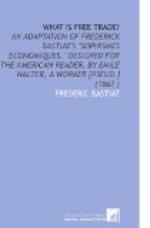“Again, when any article, as coal, iron, cheese, or cloth, comes to us from foreign countries with less labor than if we produced it ourselves, the difference in price is a gratuitous gift conferred upon us; and the gift is more or less considerable, according as the difference is greater or less. It is the quarter, the half, or the three-quarters of the value of the produce, in proportion as the foreign merchant requires the three-quarters, the half, or the quarter of the price. It is as complete as possible when the producer offers, as the sun does with light, the whole, in free gift. The question is, and we put it formally, whether you wish for the United States the benefit of gratuitous consumption, or the supposed advantages of laborious production. Choose: but be consistent. And does it not argue the greatest inconsistency to check, as you do, the importation of iron-ware, dry-goods, and other foreign manufactures, merely because, and even in proportion as, their price approaches zero, while at the same time you freely admit, and without limitation, the light of the sun, whose price is during the whole day at zero?”
CHAPTER VIII.
DISCRIMINATING DUTIES.
A poor laborer of Ohio had raised, with the greatest possible care and attention, a nursery of vines, from which, after much labor, he at last succeeded in producing a pipe of Catawba wine, and forgot, in the joy of his success, that each drop of this precious nectar had cost a drop of sweat to his brow.
“I will sell it,” said he to his wife, “and with the proceeds I will buy lace, which will serve you to make a present for our daughter.”
The honest countryman, arriving in the city of Cincinnati, there met an Englishman and a Yankee.
The Yankee said to him, “Give me your wine, and I in exchange will give you fifteen bundles of Yankee lace.”
The Englishman said, “Give it to me, and I will give you twenty bundles of English lace, for we English can spin cheaper than the Yankees.”
But a custom-house officer standing by, said to the laborer, “My good fellow, make your exchange, if you choose, with Brother Jonathan, but it is my duty to prevent your doing so with the Englishman.”
“What!” exclaimed the countryman, “you wish me to take fifteen bundles of New England lace, when I can have twenty from Manchester!”
“Certainly,” replied the custom-house officer; “do you not see that the United States would be a loser if you were to receive twenty bundles instead of fifteen?”
“I can scarcely understand this,” said the laborer.
“Nor can I explain it,” said the custom-house officer, “but there is no doubt of the fact; for congressmen, ministers, and editors, all agree that a people is impoverished in proportion as it receives a large compensation for any given quantity of its produce.”
The countryman was obliged to conclude his bargain with the Yankee. His daughter received but three-fourths of her present; and these good folks are still puzzling themselves to discover how it can happen that people are ruined by receiving four instead of three; and why they are richer with three dozen bundles of lace instead of four.




